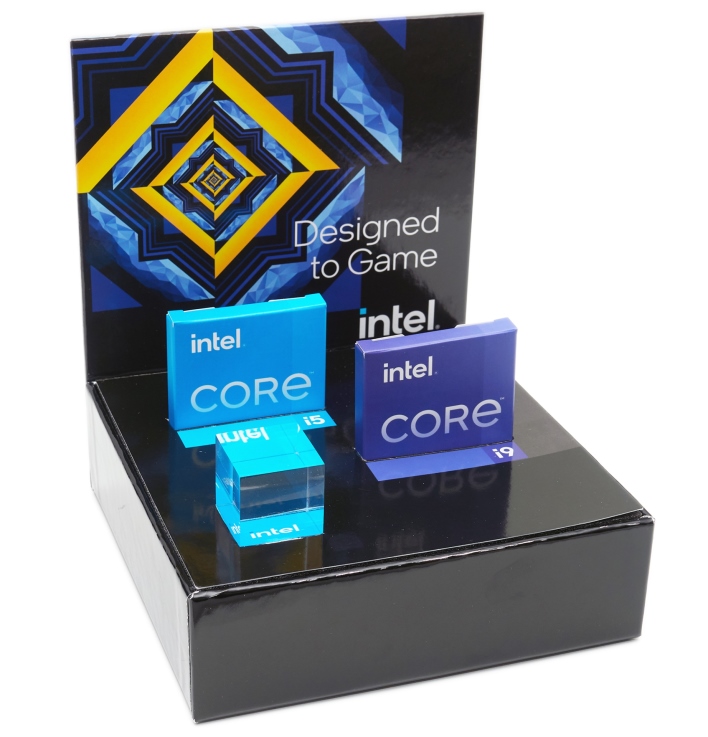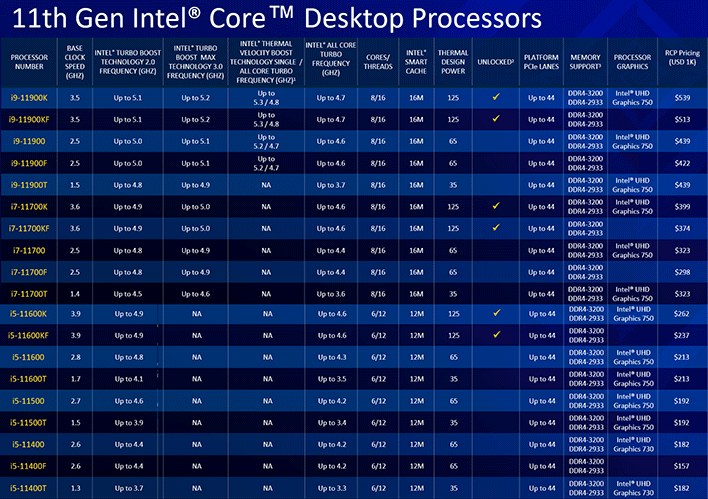Intel Core i9-11900K And i5-11600K Review: Rocket Lake-S Liftoff
Intel Core i9-11900K And i5-11600K Review: Platform Updates, Our Summary And Verdict
Intel Adaptive Boost Tested



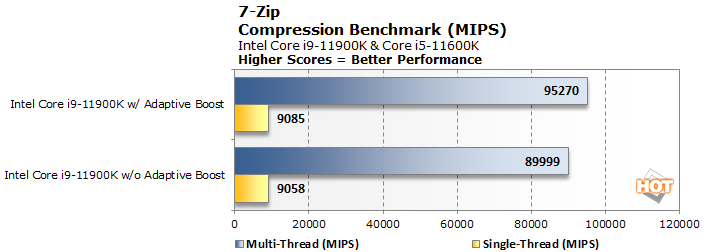
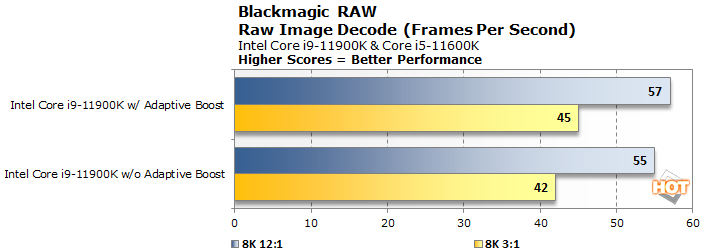
As you can see, Y-Cruncher and Speedometer showed very little to no difference in performance. The more heavily threaded applications, however, showed improvements ranging from 3 – 7%. Single-threaded workloads won’t be power or thermally constrained, whereas heavily threaded workloads will, hence the larger performance improvement with Adaptive Boost.
Rocket Lake-S Storage Performance Explored
A couple of weeks back, Intel had also disclosed that storage performance could potentially be improved with Rocket Lake-S versus competing platforms, in some configurations. Since we tested with some of the latest PCIe 4 Samsung SSDs, we ran a couple of quick and dirty tests to see how the behaved.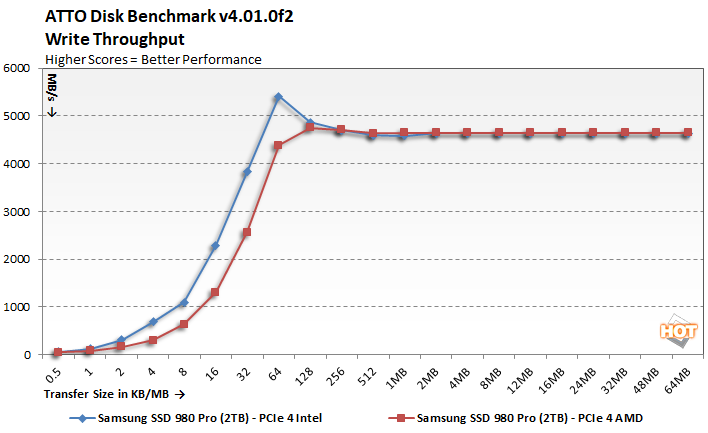
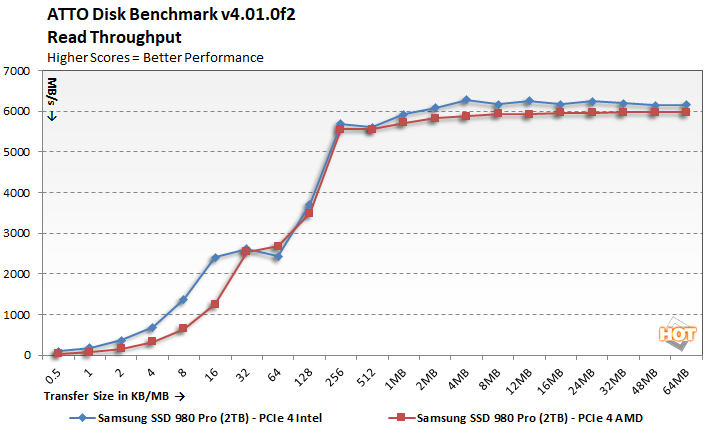
The ATTO Disk benchmark (at QD4, direct IO) showed the Intel Rocket Lake-S platform offering slightly better write performance up to the 128K transfer size and better reads almost across the board – save for one dip at 64K. IOs, however, showed much starker differences...
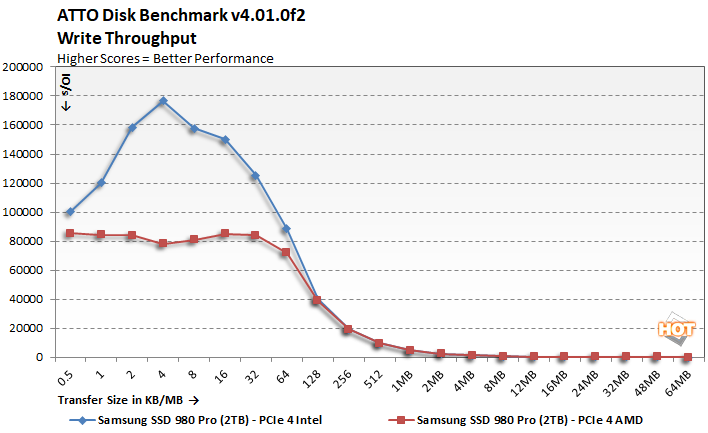
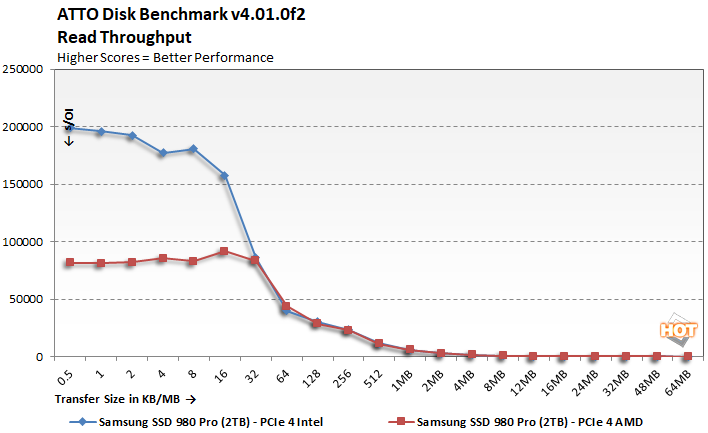
With the smaller transfer sizes, the Intel platform showed significantly higher IOs in both the read and write tests. This doesn’t mean much for consumer platforms, and we haven’t dug in deeply enough to draw and major conclusions, but thought these storage results were interesting to say the least.
Intel 11th Gen Core Processor Performance Analysis
With all of that data behind us, it’s time to figure out where Intel’s 11th Gen Rocket Lake-S-based Core processors fit in the current desktop PC landscape. We should probably break things down separately for the Core i5-11600K and Core i9-11900K, because they target very different users and price points.Looking back through the numbers, the 6-core Core i5-11600K put up clearly better performance numbers than the Core i5-10600K it supplants in Intel’s line-up, in all of the single and multi-threaded CPU-bound benchmarks, and it competed well with AMD’s 6-core Ryzen 5 5600X. Power consumption is somewhat higher with the Core i5-11600K versus the 10th Gen 10600K, but it’s not so high as to be a concern, considering its significantly better performance, more (and faster) PCI Express connectivity, a new media engine and graphics, and additional platform feature support.
The 8-core Core i9-11900K’s prospects are somewhat different. The Core i9-11900K offers arguably the best single-threaded performance of any desktop processor available today. It’s not a clear, undisputed single-threaded victory, but more often than not the Core i9-11900K was the best performer with single-threaded workloads. As was the case with the 10th Gen Core i9-10900K, the new 11900K is also a strong gaming CPU. With more heavily multi-threaded workloads though, its two fewer cores mean the previous-gen 10-core Core i9-10900K is faster. There are some instances where the Rocket Lake-S-based 11900K’s improved IPC can overcome its two-core disadvantage versus the 10900K, but it does lose to its previous-gen counterpart in multiple instances. The Core i9-11900K can also consume quite a bit more power, especially if you enable Adaptive Boost (which every enthusiast will). Lower multi-threaded performance at higher power consumption is not a great look. Better multi-core scaling with AMD Ryzen processors also means that the 8-core Ryzen 7 5800X is often faster than the Core i9-11900K in multi-threaded tests as well, though the two processors do trade blows.
We have the entire line-up of 11th Gen Intel Core processors broken down in the tables above (Intel is also refreshing its 10th Gen Core i3 and Pentium Gold line-up, but we’ve omitted them here to reduce the image size). The flagship in the line-up – the Core i9-11900K – arrives with an MSRP of $539. The Core i5-11600K is $262. At those prices, the Core i9-11900K does battle with the 8-core Ryzen 7 5800X, which is currently available for just about the same price, give or take a few dollars depending on where you shop, but can occasionally be found closer to $450. Despite offering performance that’s mostly competitive with the 6-core Ryzen 5 5600X, the Core i5-11600K’s MSRP is significantly lower -- $262 vs. $349. Rocket Lake-S has taken a lot of criticism in recent weeks, due to some early reviews of a Core i7 chip, but the more mainstream Core i5 is a more appealing and competitive part.
At the top of the stack, the Core i9-11900K isn’t a clear-cut upgrade versus its predecessor and it requires some trade-offs. It doesn’t change the competitive dynamic with AMD all that much either. Further down the stack, the Core i5-11600K’s value proposition is somewhat different. Anyone shopping for a more mainstream processor would be well served by the Core i5-11600K. The Core i9-11900K is a tougher sell, however. We also have to consider Alder Lake, which is coming later in the second half of this year. Intel has been talking a big game with Alder Lake, suggesting it could change the CPU performance landscape considerably. Alder Lake is also going to require a new socket, however. In other words, unless you’re the type to swap out your CPU, mobo, and RAM with every generation, we could see lots of folks sitting this one out.
 |
 |
|
|

